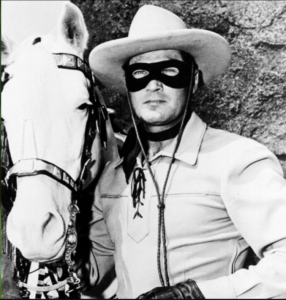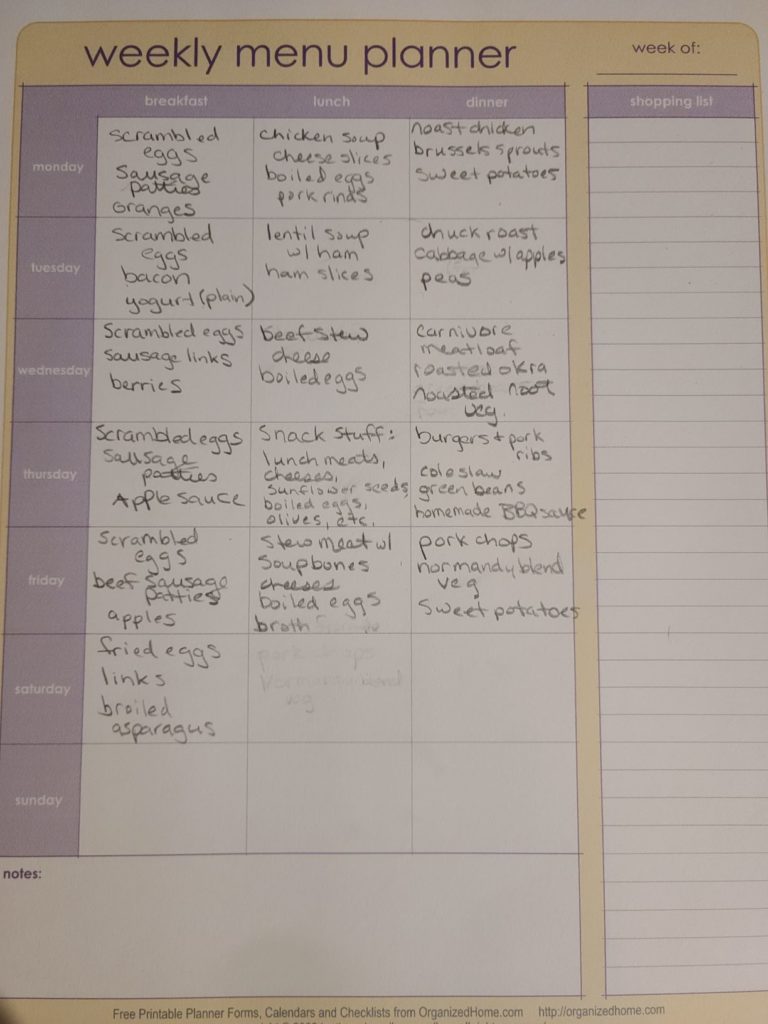How to make on-the-go carnivore nutrition:
(Pemmican) was invented by the native peoples of North America. It was widely adopted as a high-energy food by Europeans involved in the fur trade and later by Arctic and Antarctic explorers, such as Sir Ernest Henry Shackleton, Robert Falcon Scott and Roald Amundsen.
The specific ingredients used were usually whatever was available; the meat was often bison, moose, elk, or deer. Fruits such as cranberries and saskatoon berries were sometimes added. Cherries, currants, chokeberries and blueberries were also used, but almost exclusively in ceremonial and wedding pemmican.
Recipe first. Scroll on past for images and explanations.
Pemmican
Equipment
- Food dehydrator (or the sun, or a fire)
- Food processor (or rocks)
- Meat slicer (or sharp stone knife)
- Kitchen scales (or two hands and two eyeballs for estimating)
Ingredients
- 5 lb beef hearts Other lean meat may be used, but hearts are best.
- 1 lb rendered beef tallow
Instructions
- Slice beef hearts very thin using either a meat slicer (recommended) or a very sharp knife. Slightly frozen meat slices much more easily.
- Lay slices out on food dehydrator sheets in a single layer.
- Dehydrate for 6-8 hours at 167 degrees. Meat is done when it snaps nicely in two.
- Using a food processor, grind the dried meat to a powder. Don't leave large pieces, as it makes the texture of the bar much less enjoyable. This takes a while, and it's loud, so cover your ears.

- It's a good idea to get as close to a 50/50 blend of meat and fat as possible for the sake of shelf-life and flavor. Make note of the weight of both the bowl you will mix the meat in, and the saucepan in which you will melt down the beef tallow, so that you can zero out those amounts when you weigh your meat powder and tallow.

- Add the tallow to the pan and melt it down.
- Weigh the meat powder to determine how much fat to use. 5 lbs of meat will usually dry out to about 1 lb of powder. Then weigh out the same amount of fat and mix the two together.
- At this point, you can flavor your pemmican if you like. Suggested additions: 1/4 cup honey, freezedried blueberries, berry powder.
- Pour into a baking dish. I usually use a 9x13 for this amount, but you can do whatever thickness you like.
- This will set right on the counter, or you can put it in the fridge for a few minutes to go faster. After it's set, cut it into the desired number of pieces.
- Store individually wrapped in plastic wrap or baggies, or for longer shelf-life, in vacuum-sealed bags.
One of the toughest things about maintaining a carnivore diet while traveling is finding food that is just meat. No seed oils, no plants? No food! I often find myself fasting when I don’t really want to, just because there’s not much out there. Yes, you can buy some McDonald’s hamburger patties in a pinch, but I hate the drive-thru, and the rest of my family doesn’t need whatever else is on that God-forsaken menu. This Feather-Indian food is a perfect emergency and travel food, and I try to keep some on hand at all times.
It’s a little bit time consuming to make, and you need some special equipment if you don’t want to spend days making it the old-fashioned way. If you do want to make it the old fashioned way, please do take pictures and send them my way. That would be not much fun at all for me, but I’d love to see it done!
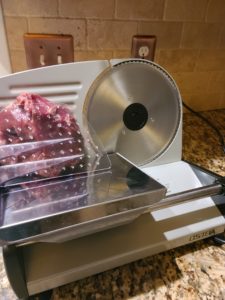
I wouldn’t do this without a good meat slicer
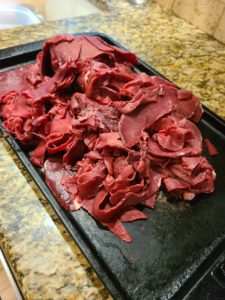
Sliced meat, ready for drying.
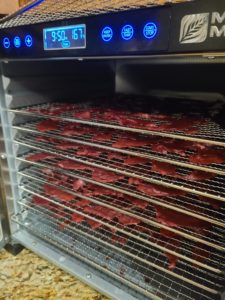
Lay your beef slices in a single layer and cook ’em!
Pemmican can be cooked into a stew or fried with vegetables for the picky, but I’ve never been motivated or hungry enough to try that. We eat it as a bar. It looks a bit like a brownie, but doesn’t resemble dessert in any other way.
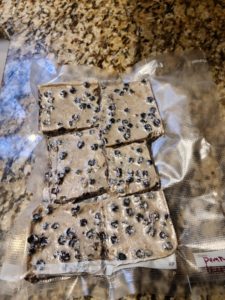
This pemmican has freeze dried blueberries sprinkled on top. Not terribly sweet, and still carnivore enough for me.
A few tips and warning before you get started:
Trim: Trim all of the fat you can from around the heart. The red, lean meat is all you want for this part. You’ll add back an equal weight of tallow, and you want the fat:protein to be as close to 50/50 as possible.
Grind! I’ve gotten pretty precise in the way I make my pemmican. My first batch wasn’t very good, to be honest. It was unpleasant to chew, and inconsistently textured. I needed to be pickier about my grind size. You need powder, not just tiny chunks. Be patient and keep grinding the dried meat no matter how long it takes, until you have actual powder.
Sweeten: You can add honey or dried fruits to this and increase both calorie count and carbs. These additions also make it much more palatable. This is survival and on-the-go food, so I don’t worry too much about the carbs, but if you’re trying to lose weight or defeat a carb addiction, leave that stuff out and just salt it when you eat it.
Preserve: Interestingly, while honey is an additional preservative, salt will make your pemmican go bad faster. Wait, wut? It’s true! Salt will draw moisture into your pemmican and shorten its shelf-life considerably. If you feel it needs flavor, add it at the point of consumption, not in the making.
Meat: Any lean meat can be used, even ground beef. If you don’t feel like slicing meat, or only have access to ground meat, 93% or leaner ground beef can be used. I’ve done it, and it tastes pretty good, but not exactly the same. If your meat is not lean enough, you will not have a very tasty or shelf-stable result. Follow all the same instructions as for sliced meat, except use a rolling pin to roll your ground meat between two sheets of parchment, thusly:
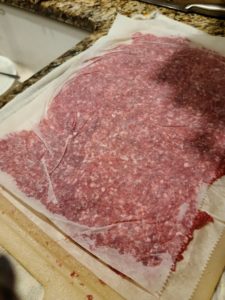
Then cut it into roughly 3 inch strips and follow the rest of the instructions.
Fat: You want tallow from a ruminant animal like beef or bison, so you have a high saturated fat content and room-temperature solidity. Lard and higher PUFA fats will not do the same thing. They’d taste awful, too, I’m sure. I imagine lamb tallow would also work. Is lamb tallow a thing?
Have you ever tried pemmican? Made it? Let me know how you do it, or if you ever even want to, by joining me on Gab, MeWe, or Social Galactic.



